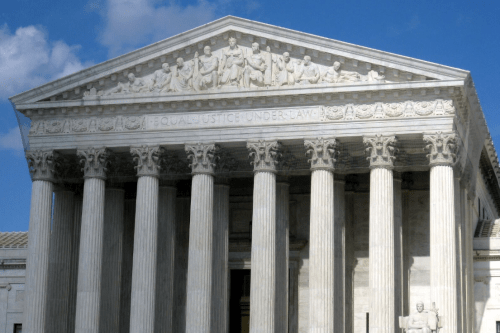Is it possible that the president once dismissed by so many Democrats (and, in private, not a few Republicans) as a towel-snapping frat boy has come up with a new and coherent political philosophy? Is there such a thing as Bushism?
Those who have long underestimated Bush need to admit that there is. The president, who is preparing to give his State of the Union address on Tuesday, has rescued and reshaped a conservative ideology that was in tatters, philosophically as well as politically. Sure, Bush’s presidency has been transformed by terrorism and his response to it. But what may prove more important to the future of American politics is Bush’s effort to bring together the diverse strands of conservatism and sustain the movement in the post-Reagan, post-Cold War age.
This is a president whose father fell victim to conservatism’s contradictions. Bill Clinton rose to power not only because of his gifts as a political tactician and synthesizer, but also because conservatives were torn asunder. They were unable to master a political world in which there was no communist enemy to rout, no strong form of liberalism to demonize. Conservatism seemed to rise again with Newt Gingrich’s 1994 revolution. But Gingrich conservatism was too combative, too devoted to an anti-government rhetoric that could not never deliver as small a government as it promised.
Bush has found a rhetorical style that makes him a friend, not an enemy of government. “Government isn’t the solution, government is the problem,” Ronald Reagan said. “Too often, my party has confused the need for limited government with a disdain for government itself,” says Bush. This is the essence of Bushism: By rejecting pure anti-government rhetoric, Bush has left himself more room to reduce the size of government. Because he is not a government basher, he’s given more leeway to limit its scope.
This rhetorical shift leads many to credit Bush with having made his party more moderate. “Bush’s Moderate Steps Bring Change to GOP,” read a Philadelphia Inquirer headline on a story about last weekend’s Republican National Committee meeting in Austin. “He’s taken the hard edge off the party,” Bill Cobey, the party’s state chairman in North Carolina, told reporter Steven Thomma.
But Bush is no Rockefeller Republican. Indeed, he is in many ways more conservative than Reagan ever was. Reagan didn’t successfully push a repeal of the inheritance tax. He didn’t propose a partial privatization of Social Security. He praised religion but never contemplated a faith-based initiative.
Paul Weyrich, the president of the Free Congress Foundation, had qualms about whether Reagan was conservative enough. He definitely had problems with Bush I. But in an open letter to the current President Bush earlier this month, Weyrich praised him as “one of the finest men to have ever served as president.” He was speaking for the conservative base, which has been overwhelmingly sympathetic to Bush from the outset. That’s because they see him as one of them. They understand that Bushism—or in deference to his father, should we call it Dubya-ism?—may be the route to a new conservative ascendancy.
Since at least the end of World War II, American conservatism has confronted a political and philosophical split between libertarians and traditionalists. The libertarians value the free market above everything and see human liberty as the highest value. The traditionalists emphasize community over individualism, values over profits, self-discipline over consumerism. “Conservatism is something more than mere solicitude for tidy incomes,” wrote traditionalist thinker Russell Kirk in 1954. “Economic self-interest is ridiculously inadequate to hold an economic system together, and even less adequate to preserve order.”
In the 1950s, William F. Buckley Jr., then a young editor, and his ally Frank Meyer sought to meld these two strands of conservatism. They created what came to be known as “fusionism.” Donald Devine, a political scientist who served in the Reagan administration, has argued that fusionism saw America as, at heart, a conservative nation that would use the freedom libertarians preached in defense of traditional values.
Whether fusionism ever worked philosophically, it worked politically by fusing conservatives into a common cause: beating the liberals at home and the communists abroad. This is the consensus that nurtured Reagan; his victory was a triumph of fusionism.
But it also brought home its limits: In practice, traditionalists and libertarians still disagreed on a great deal. Moreover, after Reagan won and prospered, the liberal enemy came to seem far less fearsome. And the death of communism robbed conservatives of the anti-communism solvent that could heal so many wounds and divisions.
Now comes Bush, the instrument of a new fusionism. Like libertarians, he has made tax cuts a central article of his creed. His devotion to business is reflected in his efforts to roll back regulations from the Clinton era and to open federal lands to energy development. Bush is a corporate conservative, and proud of it.
But he also calls himself a compassionate conservative. Why? Because he, like the traditionalists, understands that most people do not draw meaning from the marketplace alone, and that the marketplace is not the sole or most important source of virtue. “The invisible hand works many miracles, but it cannot touch the human heart,” he declared in July 1999. “We are a nation of rugged individuals. But we are also the country of a second chance—tied together by bonds of friendship and community and solidarity.”
Note well: Bush’s rhetoric on the limits of markets is not about changing or regulating them more. Instead, it’s about strengthening non-market institutions outside of government. In line with traditionalists, he argues that the markets’ cool calculations should be tempered not so much by the state as by those havens in a heartless world—family, church and neighborhood. Bush the First made a small bow toward this view with his “thousand points of light.” Bush the Second has made it a central theme of his presidency, and will no doubt touch on it again in his State of the Union address Tuesday night.
Thus compassionate conservatism must be understood as anything but a capitulation to liberalism. Take Bush’s strong words about the poor in his inaugural address: “In the quiet of the American conscience, we know that deep persistent poverty is unworthy of our nation’s promise. And whatever our views of its cause, we can agree that children at risk are not at fault.” So far he has everybody around the table with him, seated from left to right.
He went on to say: “Abandonment and abuse are not acts of God, they are failures of love. And the proliferation of prisons, however necessary, is no substitute for hope and order in our souls.”
His language is important: The root causes of poverty, he’s saying, are personal and moral, not social and economic. He has shifted the focus to individuals, and their shortcomings.
In the same speech, Bush declared: “Compassion is the work of a nation, not just a government. And some needs and hurts are so deep that they will only respond to a mentor’s touch or a pastor’s prayer. Church and charity, synagogue and mosque lend our communities their humanity and they will have an honored place in our plans and in our laws.”
Whatever this is, it’s not the New Deal or the Great Society. It’s conservatism of an old sort.
Because Bush’s philosophy is so candidly tied to the interests of corporate America, it could be vulnerable to a popular revolt against the kind of corporate abuses unearthed by the Enron collapse. Robert Borosage, a liberal activist, has coined the term “Enron Conservatives” to highlight the coziness of part of the right with large private interests (and, as Russell Kirk might put it, their solicitude for tidy incomes).
Bush’s critics suggest his true priorities lie on the corporate, not the compassionate, side of the philosophy. Bush has spoken often about making it easier for lower-income people to deduct their charitable contributions, a core plank of his compassionate conservatism. But when the time came to write a tax bill, it included cuts in inheritance taxes, not the expanded deductions for charitable giving. Before he anticipated the need for more defense spending, to which priority did Bush dedicate the largest share of the now-vanished surplus? The tax-cut package, of course.
In one area, Bush has clearly broken away from conservative orthodoxy. In agreeing to an education bill that envisions a strong federal role and calls for spending increases, Bush has moved his party a long way from its support just a few years ago for abolishing the federal Department of Education.
This might be seen as a practical concession to political reality: Education had always been an issue on which Democrats had a large advantage. At a moment when education loomed so large on the electorate’s agenda, Bush was not about to let this advantage stand.
But a focus on education fits well with Bush’s philosophy. If individuals are expected to fend for themselves—and if the economic system is, as Bush sees it, fundamentally just—then improving schools is a justifiable social change. Better schools mean that individuals, including the poor, will be better able to compete. Once schools have done their job, government can get out of the way and let the competitive system work. Here again is Bushism at work: While many conservatives assail all liberal ideas and icons, Bush assimilates them to his cause.
Just last week, in his speech honoring Martin Luther King Jr., the president said: “We see Martin Luther King in many ways. Perhaps above all, we should see him as a minister of the gospel…Here on all roads of life, said Dr. King in a sermon, God is striving in our striving. As we struggle to defeat the forces of evil, the God of the universe struggles with us.”
Thus is the great civil rights leader, the critic of economic as well as racial injustice, brought into the fold of compassionate conservatism. Thus is the pacifist (or near-pacifist) invoked as an ally in the war on terrorism.
The war will have a strong supporting role in his new conservatism. Already it has shielded Bush, at least temporarily, from the main lines of attack he would have confronted otherwise: the effect of his tax cuts on long-term deficits (which can be blamed on war needs) and the economic downturn (which can be blamed on Osama bin Laden). If communism once helped hold conservatism together, terrorism could have the same effect.
But the public’s positive reaction to Bush’s handling of the war also underscores Bushism’s possible weakness. Until Sept. 11, the polls showed Bush with the same half of the country as he had on Election Day 2000. Neither compassionate conservatism nor corporate conservatism has won him converts. What has sent his popularity sky-high is “patriotic” conservatism (shades of John McCain) or even “big-government” conservatism (a reflection of the public’s desire for more security in the face of terrorism). This suggests that if Bushism fails, a different conservative synthesis could emerge, perhaps with McCain as its champion.
For now, the future of the American conservative movement depends on the success of Bush’s marriage of corporate and compassionate conservatism. Bush’s conservative supporters clearly understand this; his opponents need to understand it, too. They may not see him as a philosopher king, but they must see this: His project is not simply to get reelected, but to remake American conservatism.
E.J. Dionne is a Washington Post columnist and a senior fellow at the Brookings Institution.


Commentary
Op-edConservatism Recast; Why This President’s Reach Could Be Monumental
January 27, 2002